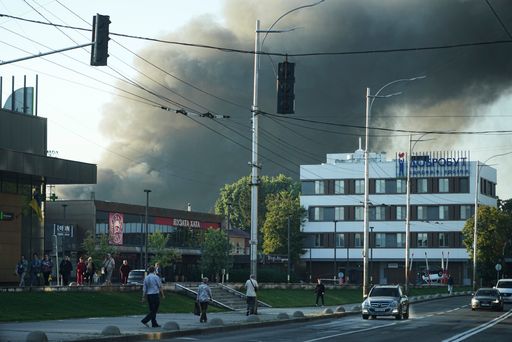On Sunday, September 7, Russia launched its largest air assault on Ukraine since the war began, deploying 805 drones and 13 missiles.
The attack resulted in at least four deaths, including a child, and left over 20 people wounded.
Notably, the main government building in Kiev's Pecherskyi district was set ablaze, marking the first time a central government facility has been targeted during the conflict.

What’s different?
This latest assault stands out for several reasons.
It is the most extensive airstrike since the beginning of the war, with Russia deploying over 800 drones and missiles in a coordinated attack.
Unlike previous strikes that mainly targeted military and logistical sites, this operation directly hit the Kiev government headquarters, marking a significant shift in Russian targeting strategy by focusing on central government infrastructure.
Additionally, the attack caused civilian casualties, including at least four deaths and more than 20 injuries, and resulted in widespread damage to residential areas, underscoring the ongoing humanitarian toll of the conflict.
Why is it significant?
This recent escalation carries several important implications.
Firstly, the unprecedented scale and nature of the attack seriously undermine any remaining hopes for a near-term resolution to the conflict, especially as it comes amid ongoing international diplomatic efforts aimed at peace.
Secondly, the international reaction has been swift and condemning; the United States and European allies have denounced the strikes, with US President Donald Trump indicating the possibility of imposing new sanctions on Russia to increase pressure.
Ukrainian officials have also highlighted the attack's humanitarian toll, emphasising the need for stronger air defenses and international support.
Lastly, the attack’s targeting of civilian areas has exacerbated the already dire humanitarian crisis in Ukraine, drawing widespread international condemnation from human rights organisations and global leaders alike.
The barrage came after more than two dozen European countries pledged to patrol any agreement to end the war, some of whom said they were willing to deploy troops on the ground.
Kiev says security guarantees, backed by Western troops, are crucial to any peace deal to ensure Russia does not invade again in the future.
But Russian President Vladimir Putin has said any Western forces in Ukraine are unacceptable and would be "legitimate" targets.
Efforts in recent weeks by Trump to end the war have so far yielded little progress.
Tens of thousands have been killed in three-and-a-half years of fighting, which has forced millions from their homes and destroyed much of eastern and southern Ukraine in Europe's deadliest conflict since World War II.

What happens next?
In the aftermath of this unprecedented attack, several critical developments are expected to unfold.
Ukraine is likely to escalate its military response, with increased counterattacks targeting Russian infrastructure and military assets as Kiev seeks to deter further strikes and reclaim strategic advantage.
At the same time, international diplomatic efforts may intensify, with key global actors, including the United Nations, European Union, and the United States, pushing for renewed peace negotiations.
However, the severity and timing of this attack risk complicating these talks, as mutual distrust deepens and demands from both sides harden.
In parallel, the US and EU are anticipated to impose additional rounds of sanctions on Russia, aiming to increase economic and political pressure to curb further aggression.
These sanctions may include restrictions on technology exports, financial transactions, and energy supplies, further isolating Russia on the global stage.
The overall situation remains highly fluid, with the international community closely monitoring developments to evaluate their broader impact on regional stability, humanitarian conditions, and global security dynamics.




















